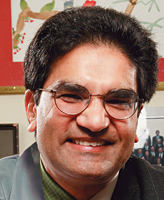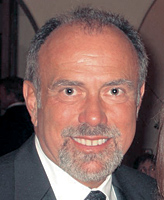New
asset management initiative brings alumni support, real money
to enhance Kellogg School finance strength through experiential
learning
By
Romi Herron
Updated with correction: May 16, 2007
After
more than two decades on Wall Street, Avi Nash '81
has become convinced that it's easy to make investment mistakes.
"It
is easy to confuse good luck with smarts," says Nash,
retired Goldman Sachs partner and now head of his own management
consulting firm, Avi Nash LLC. "When things go well,
we think we are brilliant. But sometimes when something does
work, it's actually a rising tide lifting all boats."
But
such good fortune benefits from analysis of what really drives
earnings, says Nash. This is what the Kellogg School's new
Asset Management Practicum will provide to students this spring
when the innovative experiential finance course begins.
Thanks
to an endowment of more than $3 million for portfolio management,
and a targeted fund of $8 million, Kellogg students will face
real market dynamics as they try to invest this money wisely.
"This
is clearly action learning," says Robert
Korajczyk, the Harry G. Guthmann Distinguished Professor
of Finance, who is leading the course. "Experiential
learning is one of the Kellogg cornerstones."
While
students won't quite have a personal financial stake in the
game, says Nash, they will be investing real dollars, tracking
and analyzing the results. "They will learn the difference
between a good company and a good investment and how to make
better decisions under uncertainty."
Those
are the lessons that Korajczyk expects students to glean.
"Students
will blend academic research with practical insights from
visiting practitioners and day-to-day portfolio management,"
says Korajczyk, who also is director of the Zell
Center for Risk Research at Kellogg. In addition, students
will learn how to execute trades to minimize costs and have
invaluable exposure to investment styles, factors of client
servicing and risk minimization." The one-year minimum
commitment gives students opportunities they cannot find elsewhere
or replicated in a pretend portfolio.
The
practicum also will forge stronger connections among investment
practitioners in the finance industry and Kellogg students,
broadening placement opportunities for graduates, Korajczyk
says. He adds that most peer schools do not offer courses
where an actual cash portfolio is a core element. Kellogg
can do it because of alumni and faculty support and expertise.
| |
 |
| |
Jerome
Kenney '67 |
| |
|
| |
 |
| |
Avi
Nash '81 Photo © David
Neff |
| |
|
| |
 |
| |
Jeff
Ubben '87 |
| |
|
| |
 |
| |
Malcolm
Jones '82 |
| |
|
Aligned
with investors' philosophies Kellogg
donors made this practicum possible through their contributions
— intellectual as well as financial — sharing
their research and insights as Kellogg began developing the
offering. "Alumni, serving as mentors in roles of securities
analysts, investment managers and trading strategy analysts,
will provide feedback on the students' stock analysis, make
recommendations to construct the portfolio and determine execution
strategy," says Korajczyk.
Jeff
Ubben '87, a founding partner of Valueact Capital and
former chairman of Martha Stewart Living Omnimedia, is among
those supporting the course. He says he invests both his money
and influence in ventures offering the greatest return potential.
The Asset Management Practicum meets his rigorous criteria.
His
involvement in the school's Investment Management Club (IMC)
as a student helped feed his interests in finance, as did
Professor Lawrence Revsine's accounting class. Armed
with the fundamentals, he developed a common-sense approach
as part of his investment philosophy.
"Never
underestimate the value of common sense in this business,"
he says. "The key is to ask yourself, 'Why is that guy
selling his stock to me?'"
Often,
short-term fears drive volatility. "I am a long-term
investor," says Ubben, who also is an active one, involved
in the companies whose stock he holds. "I'm not just
sitting in front of a screen watching the ticker. If I can
own 15-20 percent of a company and move the board and influence
events and the capital allocation process, to me that's the
most important part of investing," he says.
Ubben
will have an influence in the Kellogg initiative too, providing
feedback during the course, enabling him to raise recognition
for the school's strong finance program.
Another
backer is Jerome "Jerry" P. Kenney '67, who
in his 41st year in the investment industry sees the field
as "rapidly expanding and one of the most important areas
in the country's entire job market." The Merrill Lynch
vice chairman believes that financial education is critical
not only for professionals, but for all Americans. As proof,
one need only review statistics indicating a paucity of personal
savings in the U.S. "Asset management education is a
capability we can export worldwide," says Kenney.
Equally
enthusiastic for the Kellogg practicum is Malcolm Jones
'82, principal of Trinity Partners. "This effort
will provide power for students' careers and reflect extremely
well on Kellogg," says Jones.
Jones
says he has ventured occasionally into alternative investments
and recognizes that the later stages of the asset management
curriculum — derivatives and hedge funds — will
prove particularly compelling.
"If
you are going to pay for active management, you should expect
to be rewarded for it," he notes. But in large-cap growth
equities, active managers have struggled to consistently beat
benchmarks, Jones says. "Understanding of selling short
versus long is a whole new world. I have observed very good
long-only portfolio managers who were not nearly as successful
when they started to do a short hedge fund. Short-selling
is a skill — it's not just selling something you don't
like."
Reaching
all corners Looking
ahead to an investment career, Lance Garrison '07,
IMC co-chair, sees the Asset Management Practicum adding strength
to the learning experiences available in IMC, a club in which
members meet biweekly to review stock pitches and a $300,000
portfolio.
"The
Asset Management Practicum represents a tremendous opportunity
for Kellogg students to participate in investment analysis,"
Garrison says. "It provides fundamental skills along
with dynamic faculty and the expertise of Kellogg alumni whose
influence reaches all corners of the investment world."
Kenney
says the program's timing could not be better.
"American
culture is no-cash-down [where] dazzling temptations and technology
reinforces the consume-more-early concept," he says.
"People don't realize until it's too late that they haven't
saved any money. They need to learn about avoiding fad investments,
and avoiding buying a bigger house than necessary."
But
saving, he adds, while essential, is not the same as investing,
which involves building a sound asset diversification.
"People
need to be educated on the value of this," Kenney says.
"With the new Kellogg program we will produce an educated
group with a clear advantage who will advise others around
the world." |



